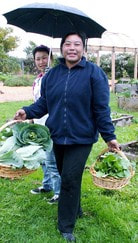 Win Kyi at Wonthaggi's community garden
Win Kyi at Wonthaggi's community garden By Linda Gordon
IN A former life Win Kyi was a farmer. Like most successful farmers she understood the land and worked with it to produce food.
Unlike most farmers she was forced to leave her land and her country behind and join the ranks of Burma’s dispossessed. More than a decade in a refugee camp for displaced people on the Thai Burma border followed.
IN A former life Win Kyi was a farmer. Like most successful farmers she understood the land and worked with it to produce food.
Unlike most farmers she was forced to leave her land and her country behind and join the ranks of Burma’s dispossessed. More than a decade in a refugee camp for displaced people on the Thai Burma border followed.
And now, miraculously, Win Kyi and her family live in Wonthaggi. Her story lacks vital details, I know. But language is a barrier and too many questions that call up the difficult journey from there to here can be intrusive, upsetting.
What is understood is that Win Kyi is very good at growing food, and that I am learning from her at Wonthaggi's community garden. She tells me that not just the showy heart of the cauliflower can be eaten but also the abundant, nutritious leaves, and I see the waste through her eyes.
Our shared garden plots have never looked healthier or produced more winter crops. We have harvested baskets of cauliflowers, cabbages, broccoli, radishes – red and white, kale, silver beet, coriander, carrots and lettuce.
It is a group effort but Win Kyi’s work ethic and confidence have influenced us all. Every week, through the winter, we have divvied up enough produce at the end of the morning’s work for four or five gardeners to go home with ingredients for soups and salads.
Last week in a persistent drizzle we cleared the last of the broccoli and cabbages to make way for spring planting. Already on the list to go in the soil are snow peas, pak choi, chillies, capsicum and an experiment with early cucumbers.
Meanwhile Win Kyi is learning English in class and with the help of a volunteer tutor. Each time we get together at the Wonthaggi Community Garden she has questions about the names of plants, which parts we eat and when and how we grow them.
It’s a boon having a farmer among us; one with such a talent for gardening and determination to grow.
What is understood is that Win Kyi is very good at growing food, and that I am learning from her at Wonthaggi's community garden. She tells me that not just the showy heart of the cauliflower can be eaten but also the abundant, nutritious leaves, and I see the waste through her eyes.
Our shared garden plots have never looked healthier or produced more winter crops. We have harvested baskets of cauliflowers, cabbages, broccoli, radishes – red and white, kale, silver beet, coriander, carrots and lettuce.
It is a group effort but Win Kyi’s work ethic and confidence have influenced us all. Every week, through the winter, we have divvied up enough produce at the end of the morning’s work for four or five gardeners to go home with ingredients for soups and salads.
Last week in a persistent drizzle we cleared the last of the broccoli and cabbages to make way for spring planting. Already on the list to go in the soil are snow peas, pak choi, chillies, capsicum and an experiment with early cucumbers.
Meanwhile Win Kyi is learning English in class and with the help of a volunteer tutor. Each time we get together at the Wonthaggi Community Garden she has questions about the names of plants, which parts we eat and when and how we grow them.
It’s a boon having a farmer among us; one with such a talent for gardening and determination to grow.